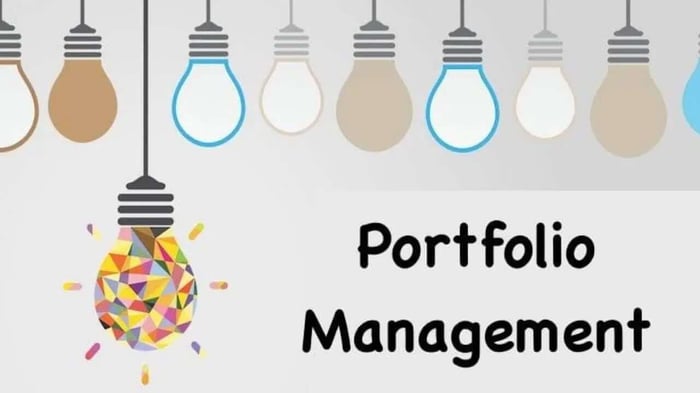Table of Contents
- What is the Portfolio Management Professional (PfMP) Certification? 📚
- How the PfMP Certification Boosts Your Career? 🚀
- How to Obtain the Portfolio Management Professional Certification (PfMP) Certification 📚
- PfMP vs Other Agile Certifications: What’s the Difference? 🤔
- Key Responsibilities of a Portfolio Manager 📋
- 10 Lesser-Known Facts About PfMP 📊
- Final Thoughts 💡
- FAQs
Picture this: You’ve got a mountain of projects on your plate, each one more complex than the last, and you're juggling them like a circus performer trying to keep everything in the air. Now, imagine having the power to lead those projects with unparalleled precision and efficiency. The Portfolio Management Professional Certification (PfMP) might just be your golden ticket to mastering that art! 🎟️
In the world of project management, PfMP is a prestigious certification that marks you as a true leader in portfolio management. But what does that mean? And how can it boost your career to new heights? Buckle up because in this blog, we’ll take you through the ins and outs of the PfMP certification and show you why it’s the ultimate power-up for your project management career. 💼🚀
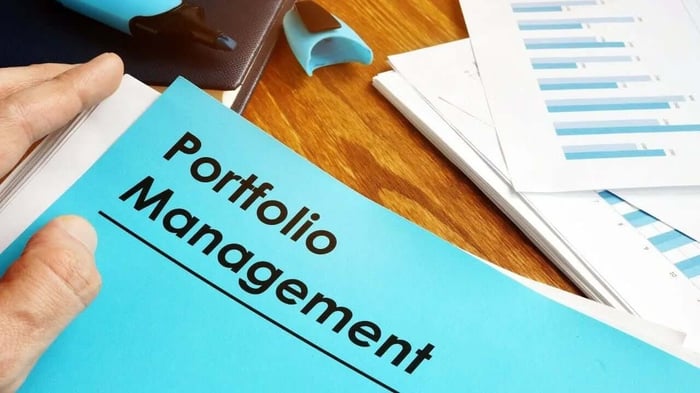
What is the Portfolio Management Professional (PfMP) Certification? 📚
The Portfolio Management Professional certification is a globally recognized credential from the Project Management Institute (PMI) that showcases your expertise in managing portfolios of projects and programs. Unlike project managers, who focus on individual projects, portfolio managers oversee a collection of projects and ensure they align with the organization's strategic goals.
This certification is designed for senior professionals with a wealth of experience in managing complex portfolios. It demonstrates not only your ability to manage multiple projects but also your strategic thinking, decision-making skills, and ability to deliver value to an organization.
If you're just starting your project management career, you might want to check out our guide on the best project management certification for beginners to help you choose the right starting point.
What’s Coming Up Next: In the next section, we will explore how obtaining this certification can significantly boost your career and professional value.How the PfMP Certification Boosts Your Career? 🚀
If you’ve ever wondered how to climb the project management career ladder faster, the PfMP certification is your answer! 🌟 Here’s how it can transform your professional life:
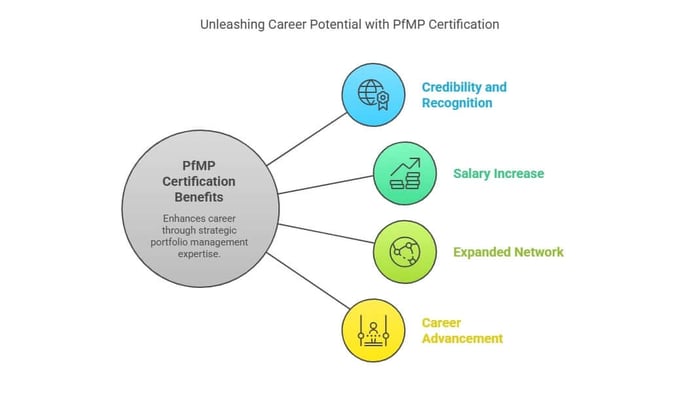
1. Credibility and Recognition
When you have the PfMP certification, it shows you’re more than just a manager. You are a strategic leader, capable of managing portfolios that drive business success. It’s a globally recognized credential that adds massive credibility to your resume and makes you stand out in a crowded job market.
2. Salary Increase
According to PMI’s latest salary survey, certified professionals typically earn significantly more than their non-certified counterparts. With the PfMP, you can expect a substantial salary boost due to the high-level expertise it demonstrates.
3. Expanded Network
The Portfolio Management Professional Certification connects you to a global network of like-minded professionals, offering opportunities for collaboration, mentorship, and career growth. Networking with other top-tier professionals can lead to job opportunities and partnerships you may not have had access to otherwise.
4. Career Advancement
This certification opens the door to leadership roles such as portfolio manager, program manager, and even senior executive positions. Organizations seek professionals with strategic vision and the skills to align projects with business goals—and that's exactly what the PfMP certifies you for.
For those who are looking to get certified quickly, you can explore the easiest project management certification that can help you gain fundamental skills without the lengthy process.
What’s Coming Up Next: Let’s dive deeper into how you can obtain the PfMP certification and what steps are involved.How to Obtain the Portfolio Management Professional Certification (PfMP) Certification 📚
Getting the Portfolio Management Professional Certification (PfMP) certification requires a combination of experience, education, and a formal exam. Here’s a step-by-step breakdown of what you need to do to obtain this prestigious credential:
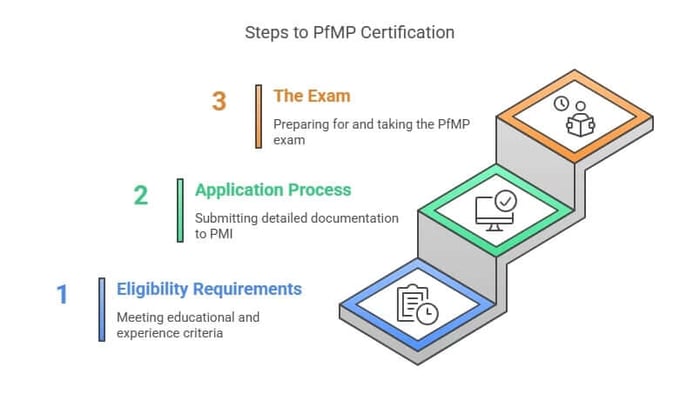
1. Eligibility Requirements
To qualify for the PfMP certification, you need:
A four-year degree (bachelors or global equivalent)
4,500 hours of portfolio management experience over the past 8 years (or 6,000 hours if you have a high school diploma)
35 hours of formal project management education (can be obtained through PMI-accredited courses)
2. Application Process
Once you meet the eligibility criteria, you can submit your application through PMI’s website. This involves documenting your portfolio management experience and providing detailed information about your roles, responsibilities, and achievements.
3. The Exam
The PfMP exam is a rigorous test that covers a wide range of topics, including:
Portfolio Strategy and Alignment
Governance and Portfolio Performance
Risk and Financial Management
Stakeholder Management
The exam consists of 170 multiple-choice questions, and you’ll have four hours to complete it. The passing score is based on the overall difficulty of the questions, so it’s essential to study thoroughly.
What’s Coming Up Next: Curious how PfMP compares to other agile certifications? Let’s explore the differences in the next section.PfMP vs Other Agile Certifications: What’s the Difference? 🤔
There are numerous agile certifications out there, but how does PfMP compare to others like Certified ScrumMaster (CSM) or PMI Agile Certified Practitioner (PMI-ACP)? Here’s a quick breakdown to help you understand the differences:
Certification | Focus Area | Ideal Candidate | Key Benefit |
PfMP | Portfolio management | Senior professionals managing portfolios | Strategic alignment of projects with organizational goals |
CSM | Scrum methodology | Project managers working in agile teams | Mastery of Scrum framework and team leadership |
PMI-ACP | Agile practices across methodologies | Agile project managers | Broader agile expertise across frameworks like Scrum, Kanban, Lean, etc. |
As you can see, PfMP is geared toward individuals with significant experience in managing portfolios and aligning them with business strategy, whereas other certifications focus more on specific methodologies or frameworks.
Want to know the key responsibilities of a Scrum Product Owner? Keep reading to learn about the core tasks involved.Key Responsibilities of a Portfolio Manager 📋
A portfolio manager plays a pivotal role in overseeing and guiding a portfolio of projects to ensure they align with business objectives. Their responsibilities include:
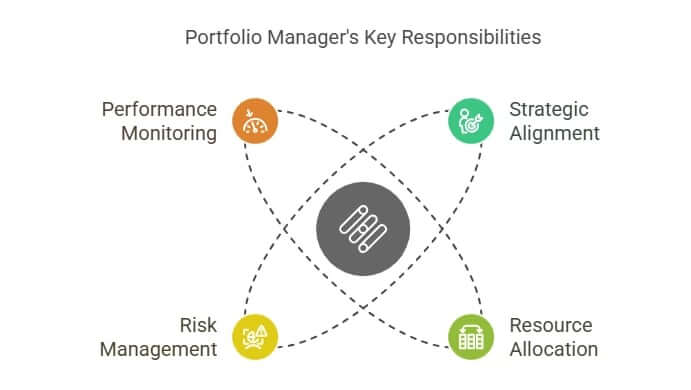
1. Strategic Alignment
Portfolio managers work with senior leadership to ensure that all projects within the portfolio are aligned with the company’s strategic goals. They evaluate potential investments, prioritizing projects that will provide the most value to the organization.
2. Resource Allocation
Ensuring that resources (people, money, time) are efficiently allocated across the portfolio is one of the key responsibilities of a portfolio manager. They are responsible for balancing the workload across projects and ensuring the right teams are assigned to the most critical initiatives.
3. Risk Management
A portfolio manager is responsible for identifying, assessing, and mitigating risks that may impact the portfolio’s success. This requires strong analytical skills and the ability to make tough decisions.
4. Performance Monitoring
Monitoring portfolio performance and ensuring that projects are meeting their objectives is another key responsibility. This involves tracking progress, managing budgets, and ensuring that timelines are adhered to.
10 Lesser-Known Facts About PfMP 📊
PfMP holders have access to a global network of experienced portfolio managers. (PMI)
PfMP certification is recognized in over 150 countries.
Portfolio managers with PfMP often manage project portfolios worth over $50 million.
PfMP increases your chances of getting hired by 30% more than non-certified professionals. (Glassdoor)
The PfMP exam is updated regularly to reflect the latest industry practices.
PfMP is one of the highest-level certifications PMI offers.
PfMP holders typically report higher job satisfaction compared to other project management certifications.
The average salary for PfMP-certified professionals is 20% higher than their non-certified peers. (Pay Scale)
PfMP certification is part of PMI’s Talent Triangle.
Organizations with PfMP-certified professionals tend to have a higher project success rate.
Final Thoughts 💡
The Portfolio Management Professional Certification (PfMP) is an exceptional credential for experienced professionals looking to elevate their careers in portfolio management. It provides a strategic advantage, boosts earning potential, and opens up numerous leadership opportunities. If you're ready to step up your game and prove your expertise in managing complex portfolios, this certification is for you!
For those seeking project management certifications that can propel your career forward, look no further than APMIC. APMIC offers a variety of project management certifications designed to help you succeed in today’s competitive business world. 🌐
FAQs
What is the PfMP certification?
PfMP is a certification offered by PMI for professionals who manage multiple portfolios and align them with organizational strategy.
How much does the PfMP certification cost?
The PfMP exam fee is typically $800 for PMI members and $1,000 for non-members.
How long is the PfMP certification valid?
The PfMP certification is valid for three years, after which recertification is required.
Can I take the PfMP exam online?
Yes, the PfMP exam can be taken online through PMI’s exam portal.
What are the prerequisites for PfMP certification?
You need a four-year degree, 4,500 hours of portfolio management experience, and 35 hours of formal education.
How long does it take to get certified?
The process to obtain the PfMP certification typically takes 3 to 6 months, depending on your study and experience level.
What is the passing score for PfMP?
The PfMP exam has a passing score that is determined based on the exam’s overall difficulty.
What are the benefits of getting PfMP certified?
PfMP certification boosts career opportunities, credibility, and earning potential by demonstrating strategic portfolio management expertise.

